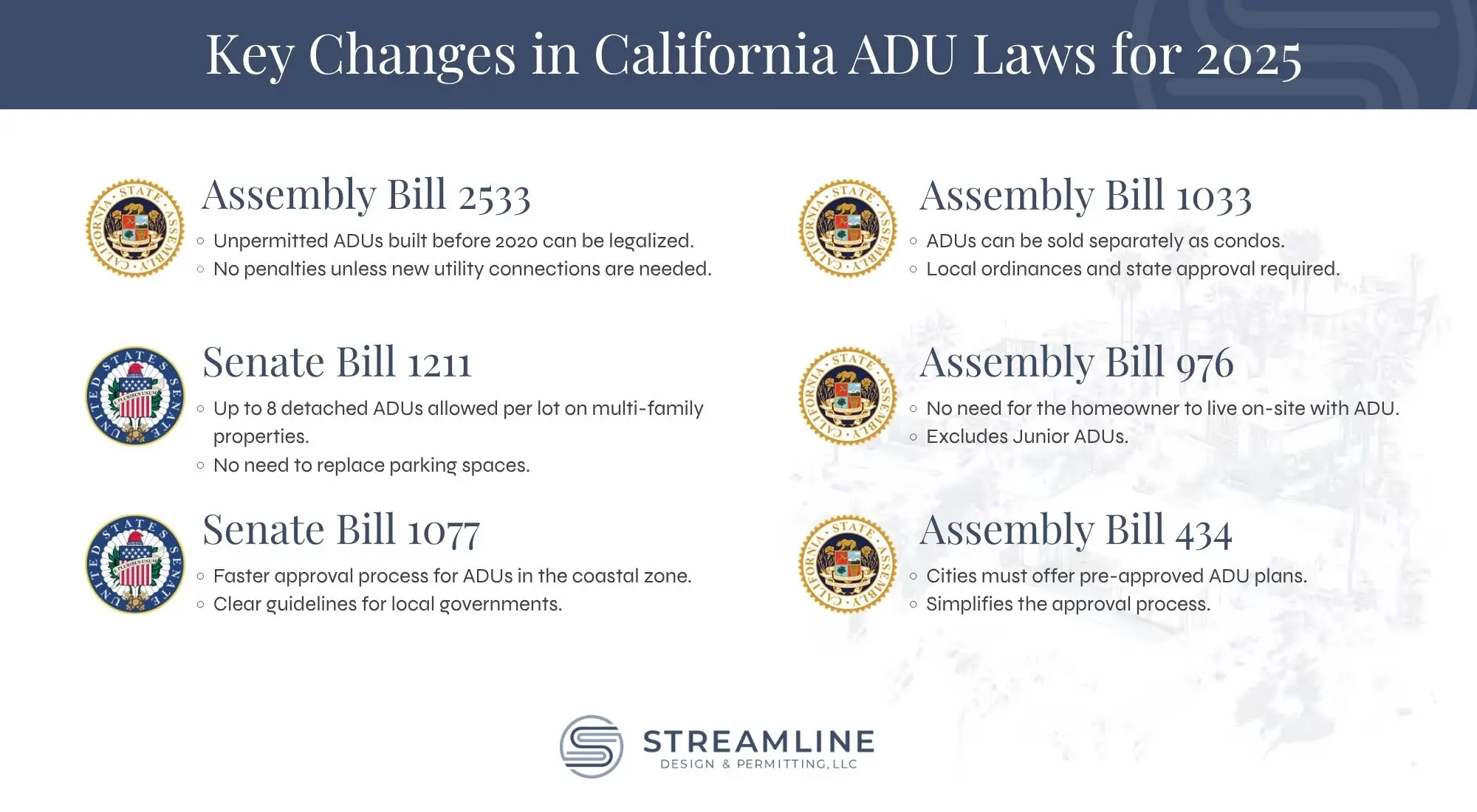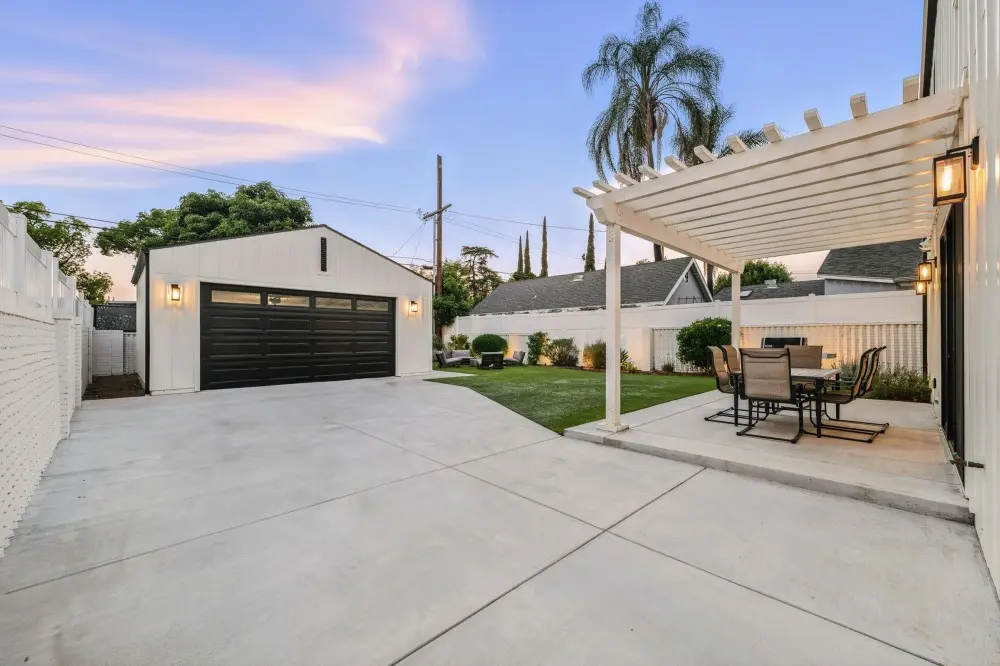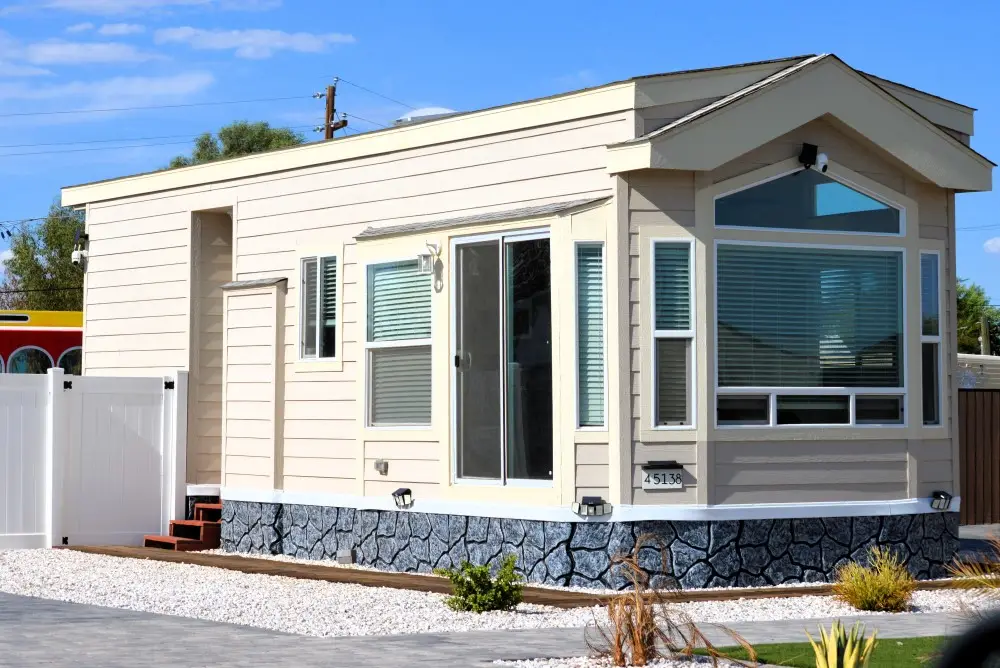California’s housing crisis has created a demand for flexible, affordable living solutions, especially in urban areas. Homeowners and investors are seeking ways to optimize their properties, but navigating construction rules can be challenging. Recent state regulations make it easier and more affordable to add living spaces, helping address the housing shortage.
If you're considering drafting ADU plans in San Diego, these new California ADU laws are an excellent opportunity to expand your property and increase its value.
Why Accessory Dwelling Units Are Gaining Popularity in California
Accessory dwelling units (ADUs) are becoming an increasingly popular solution to California’s housing crisis. Many urban areas are struggling to meet housing demand, and ADUs are an affordable option for homeowners and developers.
- Affordable housing: ADUs provide a cost-effective alternative to traditional home building, increasing the availability of affordable housing units and supporting community development.
- Rental income: Homeowners can earn rental income by adding an ADU, especially in high-demand areas where rental prices are rising.
- Family flexibility: ADUs provide private space for extended families, offering independent living while keeping families close.
- Increased property value: Adding an ADU can increase your home’s overall value, making it a worthwhile investment.
As of 2026, the California Housing Finance Agency and other state entities continue to support ADU construction with updated laws and regulations that make the process easier and more efficient.
Key Changes in California ADU Laws for 2026
The 2026 California ADU laws include significant updates to how accessory dwelling units (ADUs) are built and approved. These changes are designed to remove barriers, streamline the approval process, and simplify adding ADUs to properties. We’ve outlined some of the most important updates:

Assembly Bill 2533: Bringing Unpermitted ADUs Up to Code
A major change under the new laws is Assembly Bill 2533, which addresses unpermitted ADUs. If you have an unpermitted ADU built before January 1, 2020, that lacks the proper permits, this bill allows you to legalize it.
Key highlights of this bill include:
- Local agencies must permit unpermitted accessory dwelling units if they meet health and safety standards.
- Owners of unpermitted units will receive a checklist of required repairs or upgrades to bring the unit into compliance.
- No penalties or impact fees will be assessed unless new utility connections are required.
Homeowners can hire a private contractor to inspect unpermitted ADUs and help bring them into compliance with the law. This change helps homeowners avoid costly penalties and facilitates the legalization of existing ADUs, potentially unlocking additional housing across California.
Senate Bill 1211: More Detached ADUs in Multi-Family Zones
Senate Bill 1211 (SB 1211) increases the number of detached ADUs allowed on multifamily properties. Previously, multi-family properties could only build up to two detached ADUs. Now, SB 1211 allows owners to build up to eight detached ADUs per lot, as long as the number does not exceed the number of existing accessory dwelling units. This applies to both existing and proposed multifamily dwellings, subject to specific conditions:
- The number of detached ADUs cannot exceed the number of existing units on the property.
- The new law increases the number of ADUs allowed on multifamily properties.
- New ADUs must meet setback and height requirements.
- ADUs can be constructed in existing uncovered parking areas without needing replacement parking.
This bill provides property owners and developers with more opportunities to maximize land use in high-demand urban areas.

Senate Bill 1077: Streamlining ADU Approvals in the Coastal Zone
Building an ADU in California’s Coastal Zone has been challenging because of strict regulations that the California Coastal Commission enforces. Senate Bill 1077 aims to streamline this process by requiring the commission to issue clear guidelines to local governments, speeding up the permitting process. By July 2026, homeowners in the coastal zone will see faster approval timelines, providing better access to these desirable areas.
Assembly Bill 1033: The Possibility of Selling ADUs Separately
Assembly Bill 1033 allows homeowners to sell their ADUs separately from the primary residence through condo conversion, an action that was previously prohibited. These sales involve converting ADUs into individual condominiums, subject to local ordinances and regulations.
Local governments must pass ordinances to authorize such sales, and homeowners need approval from the California Department of Real Estate. This change opens up new opportunities, especially in urban areas, where ADUs could become valuable commodities in the housing market.
Assembly Bill 976: No More Owner-Occupancy Requirements for ADUs
Under previous laws, homeowners were required to live on-site in a property with an ADU. Assembly Bill 976 removes the owner-occupancy requirement for ADUs permitted after January 1, 2025. This will help increase rental opportunities, especially in high-demand areas. However, this doesn’t apply to Junior ADUs (JADUs), which are still subject to owner-occupancy rules.
Assembly Bill 434: Pre-Approved ADU Plans for Cities
By January 1, 2025, all California cities must offer pre-approved ADU plans to streamline the permitting process. These standardized designs will reduce wait times and ensure that ADUs meet state regulations. While cities may charge a fee for access or modifications, this law simplifies the approval process and allows homeowners to start their projects more efficiently.
2024 Updates That Continue to Shape the ADU Landscape
The 2024 ADU laws are still important, even with the introduction of new regulations in 2025 and 2026. Key updates include:
- Assembly Bill 2221: Reduces ADU plan review times to 60 days.
- Revised height restrictions: Taller ADUs can now be built near public transit and multi-family zones, up to 25 feet.
- Fire sprinkler requirements: ADUs no longer require fire sprinklers in many cases, reducing construction costs.
Get Started with Your ADU Project Today
California’s 2026 ADU laws provide flexibility, but local agencies may have their own interpretations and additional ADU rules. If you want to navigate these complexities, you’ll need expert guidance.
If you're considering drafting ADU plans in San Diego, converting a garage, or exploring new construction, now is the perfect time to take advantage of these regulatory updates. Reach out to us today for expert advice and transparent pricing.





